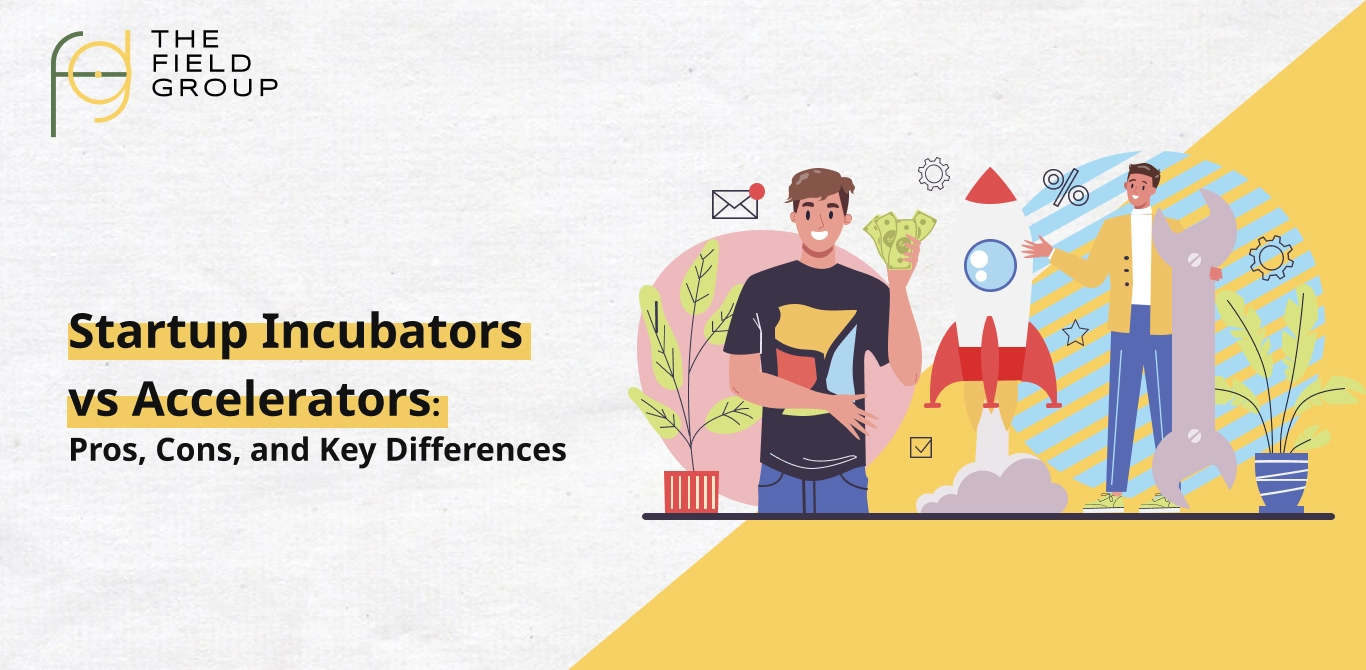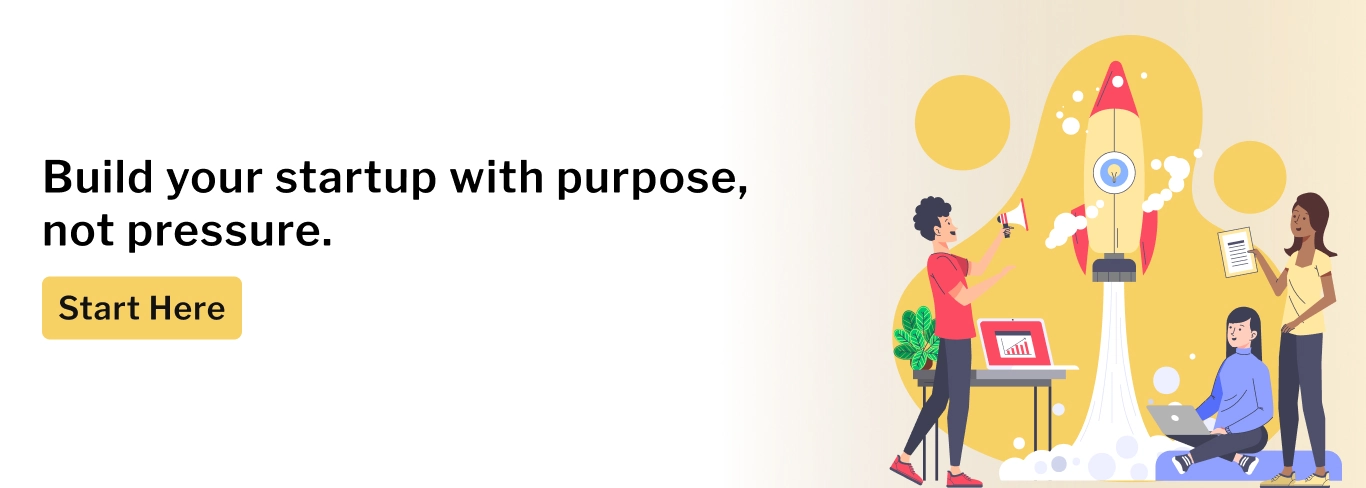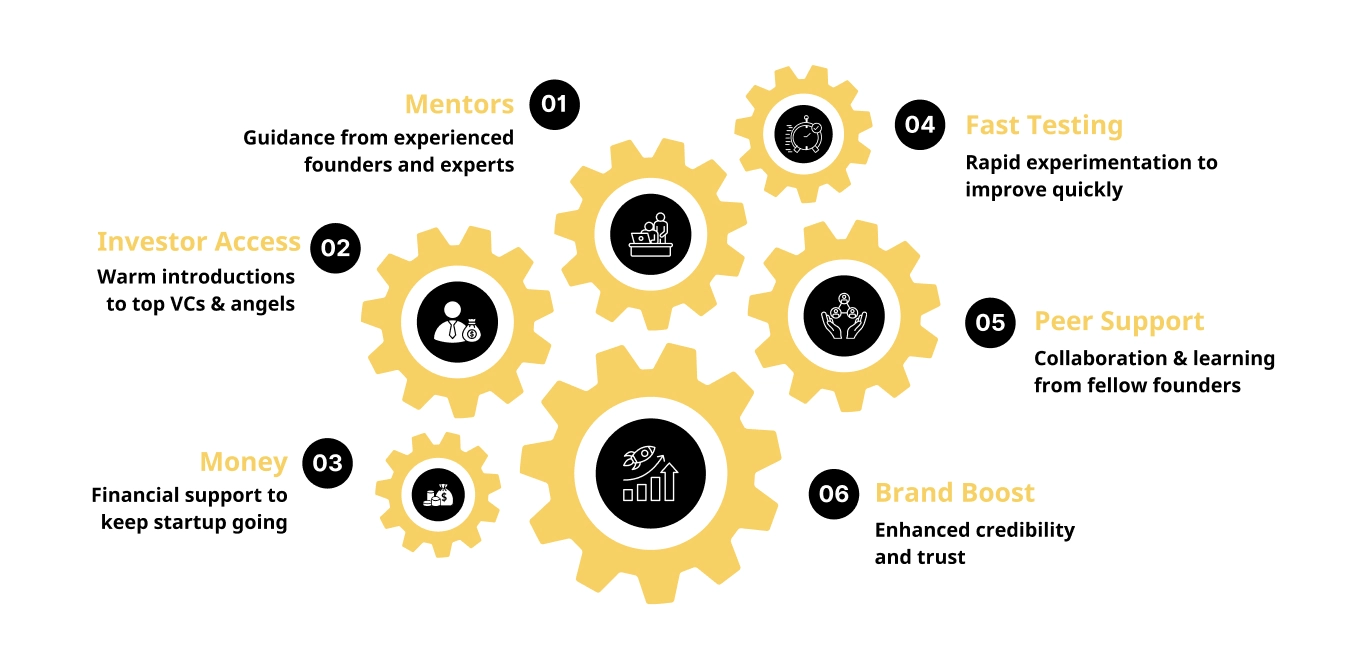Choosing between a startup incubator and an accelerator is a big decision for any founder. It can shape your whole startup journey. The path you select affects the speed of your business growth and the kind of support you get along the way.
Startup incubators and accelerators are for different stages – incubators are for early-stage ideas, while accelerators are for startups ready for growth. Both deal with different problems and play an important role at various points. Incubators aid in the development of a concept, and an accelerator aids in its development.
Choosing the Right Path
Many entrepreneurs have difficulty distinguishing between accelerators and startup incubators and are unsure of which one to choose on their startup journey. As a result, many startups choose the wrong startup incubator or accelerator program for their growth stage. CB Insights found that more than 70% of failed startups made strategy mistakes. Making such a mistake, such as choosing the wrong startup incubator or accelerator, can slow you down; therefore, it’s important to choose wisely.
What Is a Startup Incubator
Definition & Purpose
A startup incubator helps early ideas grow. It is for entrepreneurs who are still determining:
- What to build
- Who is their target audience
- How the business should work
An incubator for entrepreneurs gives you support and guidance. E.g., shared workspaces and basic administration help, as well as input from experienced mentors. It is a place to test your idea and shape your model, before growing or raising money.
How Do Startup Incubators Work
An incubator for entrepreneurs supports new founders over time. They typically run for 3 to 24 months and give founders a place to test ideas, as well as identify and solve what’s not working.
Most incubators are linked to nonprofits and universities. Some also get support from government programs. Their goal is not to earn profit, but rather to help new businesses get started.
An incubator offers:
- Flexible timelines so you can go at your own pace
- Shared space to meet other startups
- Help with legal and accounting basics
- Advice from experienced founders and experts
These programs help solo founders or small teams with clear steps.
For more detailed information about startup incubators, read: What is a Startup Incubator and how does it help Founders?
Pros & Cons
Pros
- Build at your own pace
- Get help with legal, setup, and basics
- Early-stage mentorship
- Shared workspace and peer support
- No pressure to scale fast
- Support to shape your product and message
Cons
- Smaller or slower funding
- Fewer investor connections
- Less urgency to grow fast
- Not suited for scale-ready startups
- Takes longer to show progress
- Lower brand visibility
What Is a Startup Accelerator?
Definition & Purpose
Accelerators are short programs that mostly run 2 to 10 months. Founders work hard and move fast with weekly check-ins, mentor sessions, pitch practice, and demo days.
Accelerators focus on three main things.
- Scaling: Accelerators help you find customers, hire well, and expand sustainably
- Fundraising: Most startups hope to raise money by pitching to investors
- Product-market fit: Accelerators help you to prove your product and show demand. They test if people will pay, and decide whether to scale or pivot.
The Equity Trade
Some accelerators take equity, up to 5-10% of your company. It is a way for the accelerator to profit when the startup achieves success, such as an acquisition or IPO. Others are fee-based or grant-based. In return, you get mentorship, customer connections, valuable networking, and possibly seed funding.
Who Can Benefit?
Accelerators are not necessary for every startup, but they might help you grow if you are already making progress and want to scale.
Typical Structure
Fixed Cohorts
Founders join several startups in a fast and focused program for 2-10 months. They will learn, compete, and grow together as one team, whether in-person or remote.
Weekly Structure
Most programs follow a set pattern.
- Early in the week, mentors help solve problems, make plans, and discuss funding.
- Mid-week brings group sessions on growth and hiring, along with coverage of legal and sales topics.
- At the end of the week, you share key metrics, user growth, revenue, and highlight what is working.
Demo Day
After months of work, you pitch to investors on Demo Day, which is held in a venue or online where venture capitalists and angel investors gather. Typically, you get 3 to 5 minutes to tell your story, show traction, share your vision, and answer questions. Not everyone raises money on Demo Day, but it is still a good opportunity to reach serious investors.
What You Get
- Mentors: Founders who have built and sold startups. Experienced investors and experts from successful companies.
- Investor access: Get warm introductions to top VCs and angels
- Money: Some offer funding or help you raise more during or after the program.
- Fast testing: You test everything, whether it is a product, message, price, or customers. Move and learn fast to improve quickly. You can turn months of work into weeks.
- Peer support: Your group becomes your crew, where you learn what works, share tips and contacts, and gain the best ideas from other founders.
- Brand boost: Big names help you gain credibility. Investors listen, customers trust, and people want to be part of it.
Pros & Cons
Pros
- Move fast, learn fast
- Possible funding
- Learn from experts
- Meet top investors
- Learn with other startups
- Practice your pitch
Cons
- You may give up some ownership
- Fast pace can be challenging
- Advice might not fit
- A short-term focus may distract
Startup Incubator vs Accelerator: Know the Differences
| Feature | Startup Incubator | Startup Accelerator |
| Startup Stage | Just an idea or starting out | Product or MVP already built |
| Program Length | 3 to 24 months or longer | 2 to 10 months approx |
| Pace | Slow and flexible | Fast and intense |
| Funding | Little or none | Often includes seed money to grow |
| Affiliation | Linked to nonprofits or universities | Typically supported by private firms or VCs |
| Support | Workspace and admin help. Mentorship and expert guidance. | Mentorship and investor access. Pitch preparation and guidance. |
| Best For | Founders just starting out | Teams that are ready to grow fast |
| Investor Pressure | Low | High |
| Structure | Flexible and few deadlines | Structured, with clear steps and deadlines |
Which One Is Right for You
You can choose it based on three things.
- Your stage
- Your goals
- Your team’s readiness
If You’re Just Starting
- You have an idea. You don't have a product.
- You need time and structures with support
- You’re solo or in a small team
A startup incubator program is the best option to choose.
If You’re Ready to Grow
- You have a product or MVP
- You want fast traction and investor access
- Your team is ready to move fast
An accelerator is the best option to choose.
Before You Apply, Ask About These Areas
Startup Fit
- What kinds of startups do you usually accept?
- Do you stick to certain industries or stages?
- How many startups actually make it into each cohort?
Funding & Equity
- How much funding do you give?
- What’s your standard equity take?
- Are there any random fees or surprise costs?
Mentorship
- Who are your mentors- what’s their background?
- Do they help with things like building the product, hiring a team, or raising money?
Program Structure
- How often do you check in with founders?
- What does a typical week look like?
- How long does the whole program run?
- Is it fully online, in-person, or hybrid?
Growth & Exposure
- Will I get to meet investors or connect with partners through you?
- What’s your Demo Day format?
- Can you share any stories of startups that did really well after your program?
Performance & Expectations
- How do you track progress or measure success during the program?
- What do you expect from founders, both while they’re in the program and after they finish?
Conclusion
Before you join any startup incubator program, consider whether the program fits your work style and needs. Get a sense of the structure and the people. See how involved the mentors are. A good program should match your stage, goals, and growth strategy.
The Field Group’s startup incubator is for founders who want to build a successful business. It is built for early-stage teams that need structure and clarity and want to grow with a clear path. Instead of just focusing on pitch decks, we help you build the business behind the pitch. We support your product, finances, team, and operations. You will work with experienced operators and get access to capital networks when you are ready.
Our startup business incubator is designed for entrepreneurs who want strategic clarity, operational systems, and access to investor expertise. Whether you are shaping your first MVP or gearing up for a raise, we will help you move forward.
FAQs:
How long does a startup incubator program typically last?
Most startup incubator programs run 6 months to 2 years, allowing businesses adequate time to develop, test products, and establish market presence before scaling operations.
Who should join a startup incubator?
Entrepreneurs with early-stage concepts needing mentorship, workspace, and time to refine their business model before seeking investors or rapid growth.
What industries benefit most from startup incubators?
Tech, SaaS, biotech, and fintech startups commonly benefit from startup incubators, though programs now support diverse sectors, including healthcare, clean energy, and e-commerce businesses.
Do startup incubators provide funding to startups?
Some startup incubators offer seed funding or connections to investors, though funding varies by program. Many focus on mentorship, workspace, and resources instead of direct capital investment.
Should my startup join an incubator or accelerator?
Choose a startup incubator if your idea needs development and validation; select an accelerator if you have a working product and seek rapid scaling and investor connections.










